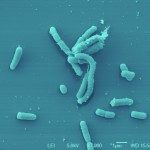Link to Pubmed [PMID] – 12879903
Biochem. J. 2003 Jul;373(Pt 2):515-22
Nucleoside monophosphate kinases (NMPKs) are essential catalysts for bacterial growth and multiplication. These enzymes display high primary sequence identities among members of the family Enterobacteriaceae. Yersinia pestis, the causative agent of plague, belongs to this family. However, it was previously shown that its thymidylate kinase (TMPKyp) exhibits biochemical properties significantly different from those of its Escherichia coli counterpart [Chenal-Francisque, Tourneux, Carniel, Christova, Li de la Sierra, Barzu and Gilles (1999) Eur. J. Biochem. 265, 112-119]. In this work, the adenylate kinase (AK) of Y. pestis (AKyp) was characterized. As with TMPKyp, AKyp displayed a lower thermodynamic stability than other studied AKs. Two mutations in AK (Ser129Phe and Pro87Ser), previously shown to induce a thermosensitive growth defect in E. coli, were introduced into AKyp. The recombinant variants had a lower stability than wild-type AKyp and a higher susceptibility to proteolytic digestion. When the Pro87Ser substitution was introduced into the chromosomal adk gene of Y. pestis, growth of the mutant strain was altered at the non-permissive temperature of 37 degree C. In virulence testings, less than 50 colony forming units (CFU) of wild-type Y. pestis killed 100% of the mice upon subcutaneous infection, whereas bacterial loads as high as 1.5 x 10(4) CFU of the adk mutant were unable to kill any animals.

